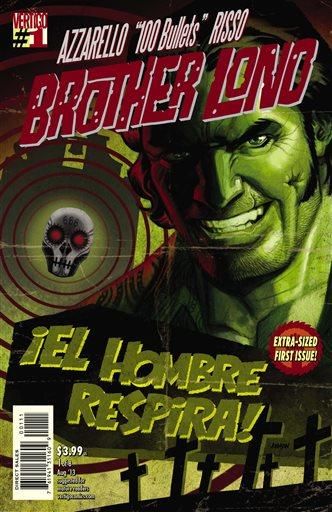If the recent New York Times profile of former Vertigo Executive Editor Karen Berger -- to say nothing of industry sentiment -- made it appear as if the position and prestige of the 20-year-old imprint have been greatly diminished under the restructured DC Entertainment, the company would like to assure you otherwise.
A new Associated Press article, which seems tailored in response to that May 29 piece, turns the spotlight away from Berger and on to her successor Shelly Bond, who has worked at the imprint since its launch in 1993.
The Times contends that Berger's departure in March "raises questions about the future of Vertigo and where its renegade spirit fits into an industry and a company that seem increasingly focused on superhero characters who can be spun off into movies and TV shows." However, Bond speaks in rosier terms about the direction of the imprint, which lost its last founding title -- and longtime flagship -- in February with the end of Hellblazer (which was resurrected in the DC Universe as Constantine).
"I am so ready to bring in some new blood and new bravado and just continue to show the masses that comics are the most essential part of pop culture," she tells The AP.
While in The Times article Neil Gaiman was uncertain how Vertigo will fare under DC Entertainment, a division of Warner Bros. created specifically to better exploit the comics properties for film, television and video games, Bond sees the new environment as an opportunity. "We want to kick down the barriers between what comic books can be and what popular culture is," she says. "I think, now more than ever, we've got that opportunity to work in different mediums."
It was tough not to take away from the earlier story that the overriding belief is that Vertigo's best days are behind it; Berger herself noted that DC is now more focused on its own characters (versus those controlled by the creators, or jointly owned, as some of the imprint's properties are), saying the publisher and Marvel "are superhero companies owned by movie studios.” As true as that may be, it's hard to swallow for fans of Vertigo, long a refuge from superheroes.
And DC Comics Co-Publisher Dan DiDio did little -- OK, nothing -- to smooth the edges of Berger's remarks, acknowledging there's "some truth" to the feeling of a shifting landscape before he delivered perhaps the most widely circulated quotes of the article, saying, "There’s not a challenge to be more profitable out of the gate. But there is a challenge to be more accepted out of the gate.” Then came the wince-inducing part: "Mr. DiDio said it would be 'myopic' to believe 'that servicing a very small slice of our audience is the way to go ahead.'”
Maybe he's right? Or maybe not. Whatever the case, it comes across as harsh and unnecessarily alienating, which may be what brings us to this Associated Press article, whose sole purpose appears to be to ease fears about Vertigo's trajectory.
"Now is the greatest time for us to actually broaden the scope," Bond says, "and I think what you'll see is that we're not only going to defy the standards and confines of traditional genre fiction, but I think we're going to redefine the industry standards because we're going to really go deep and dark into areas of psychological horror, dark fantasy, action adventure and even next-wave science fiction and mythic fiction."


